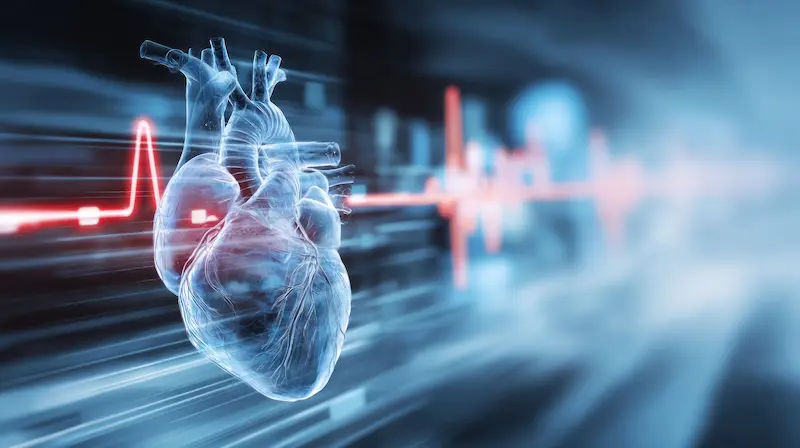Heart Block: Causes, Types, and What to Do Next
Learn about heart block, its causes, types, symptoms, diagnosis, and treatment options. Discover when it’s mild, when it’s serious, and how to take action.

Written by Dr. Vasanthasree Nair
Reviewed by Dr. Rohinipriyanka Pondugula MBBS
Last updated on 13th Jan, 2026

Introduction
Imagine your heart has its own sophisticated electrical system, much like the wiring in your home. This system sends precise signals that tell your heart muscle when to beat and pump blood throughout your body. A heart block occurs when there’s a glitch in this wiring—a delay or complete blockage of these electrical signals. This disruption can cause your heart to beat too slowly (bradycardia), irregularly, or even pause. The severity can range from a minor, often harmless delay to a serious medical emergency. This article will demystify this condition, breaking down the different types of heart block, exploring the specific causes behind each one, and guiding you on the symptoms to watch for and the modern treatments available. Understanding what leads to what can empower you to take the right steps for your heart health.
What is a Heart Block? Understanding Your Heart's Electrical System
To understand a heart block, we first need a quick tour of the heart's natural wiring. This isn't about anatomy memorisation; it's about seeing how a simple delay can cause big problems.
The Natural Pacemaker: The SA Node
In the top right chamber of your heart (the right atrium) lies a tiny group of cells called the sinoatrial (SA) node. This is your heart's natural pacemaker. It reliably fires off electrical impulses 60 to 100 times a minute at rest, setting your heart's rhythm.
The Electrical Highway: The AV Node and Bundle Branches
The impulse from the SA node spreads across the atria (the heart's upper chambers), causing them to contract and push blood into the ventricles (the lower chambers). The impulse then arrives at a critical "relay station" called the atrioventricular (AV) node. The AV node's job is to slow the signal down slightly, allowing the ventricles time to fill with blood before they're triggered to pump. After this brief pause, the signal travels down a pathway called the Bundle of His, which splits into thin fibers (purkinje fibers) that carry the impulse throughout the ventricles.
When the Signal Gets Delayed or Blocked
A heart block occurs at or near this crucial AV node. If the signal is slowed too much, partially blocked, or completely interrupted, the communication between the atria and ventricles breaks down. The ventricles might beat too slowly, or not in sync with the atria, reducing the heart's efficiency at pumping oxygen-rich blood to your brain and body.
Consult Top Specialists for Personalised Tips
The Three Degrees of Heart Block: A Spectrum of Severity
Doctors classify heart block into three main types, or "degrees," based on the severity of the signal disruption.
First-Degree Heart Block (The Mild Delay)
In this mildest form, every electrical impulse from the atria eventually reaches the ventricles, but it moves through the AV node slower than normal. It's like a car slowing down for a speed bump but continuing on. It rarely causes symptoms or problems and is often discovered incidentally during a routine ECG for another reason.
Second-Degree Heart Block (The Intermittent Block)
Here, some impulses from the atria fail to reach the ventricles altogether. It's as if some signals are hitting a dead end. This is divided into two distinct types:
- Type I (Wenckebach): This is a progressive lengthening of the delay with each heartbeat until one beat finally gets completely blocked. The pattern then resets. It's often less serious and can be caused by factors like sleep apnea or athletic training.
- Type II (Mobitz II): This is more concerning. The delay doesn't progressively lengthen; impulses are blocked suddenly and unpredictably. This often indicates a more significant problem with the heart's conduction system below the AV node and can progress to a complete block.
Third-Degree Heart Block (The Complete Block)
This is the most severe form. No electrical impulses from the atria can pass through to the ventricles. The atria and ventricles beat independently of each other. To survive, the ventricles initiate their own very slow "escape" rhythm, but it is unreliable and insufficient. This is a medical emergency that requires immediate treatment, often a pacemaker.
What Leads to Heart Block? The Most Common Causes
A heart block is not a random event; it's usually a symptom of an underlying issue. Here are the primary culprits.
Age-Related Fibrosis and Wear & Tear
As we age, the heart's wiring can naturally develop fibrosis—a thickening or scarring of the tissue. This can slow down the electrical signals. Age-related degeneration of the cardiac conduction system is a common cause of progressive heart block in older adults.
Underlying Heart Disease: The Primary Culprit
This is the most significant category of causes. Damage to the heart muscle from various conditions can disrupt the delicate conduction pathways.
- Coronary Artery Disease and Heart Attack: A heart attack occurs when blood flow to a part of the heart is blocked. If this affected area includes part of the conduction system, it can cause heart block. The severity often depends on the location and size of the attack.
- Cardiomyopathy and Heart Failure: These diseases involve the thickening, stiffening, or enlargement of the heart muscle. This physical change can stretch and damage the cells that conduct electricity, leading to blocks.
- Inflammation of the Heart (Myocarditis): Viruses or autoimmune diseases can cause inflammation of the heart muscle (myocarditis), which can swell and irritate the conduction system, leading to temporary or sometimes permanent heart block.
Other Medical Conditions and Factors
- Lyme Disease: The bacteria from a tick bite can cause Lyme carditis, where it inflames the heart tissue, particularly affecting the AV node. This is a well-known cause of reversible heart block, especially in endemic areas.
- High Potassium Levels (Hyperkalaemia): Excess potassium in the blood can alter the electrical properties of heart cells, slowing down conduction and potentially causing a block.
- Side Effects of Certain Medications: Some drugs, particularly beta-blockers, calcium channel blockers, and some anti-arrhythmic drugs, are designed to slow the heart rate. Sometimes, they can slow it too much, inducing a medication-induced heart block.
Congenital Heart Block
Some babies are born with heart block. This is often associated with autoimmune diseases in the mother (like lupus), where her antibodies cross the placenta and mistakenly attack the fetus's conduction system. It can also occur due to congenital heart defects.
Connecting the Dots: Which Cause Leads to Which Type of Block?
While any cause can potentially lead to any type of block, some patterns are more common:
- Causes of 1st-Degree & Type I 2nd-Degree Blocks: Often less sinister. These include increased vagal tone (seen in athletes), certain medications, Lyme disease (early on), myocarditis, and inferior wall heart attacks (which affect blood supply to the AV node).
- Causes of Type II 2nd-Degree & 3rd-Degree Blocks: These are red flags for significant heart disease. They are commonly linked to anterior wall heart attacks (which cause wider damage), severe cardiomyopathy, advanced age-related fibrosis, and progressive underlying heart disease. This is why Mobitz II and third-degree blocks almost always require a pacemaker.
Symptoms: How to Recognise a Potential Heart Block
Symptoms depend entirely on the severity of the block and how slow the heart rate becomes.
First-Degree & Mild Second-Degree: Often have no symptoms.
More Severe Blocks:
- Dizziness or Lightheadedness
- Fatigue and extreme tiredness
- Shortness of breath, especially with exertion
- Chest pain (if related to a heart attack)
- Fainting (syncope) or near-fainting spells
- Palpitations (a feeling of skipped beats or fluttering)
If you experience fainting, chest pain, or severe shortness of breath, seek emergency medical attention immediately.
Diagnosis: How Doctors Identify and Classify Heart Block
If a heart block is suspected, diagnosis is straightforward.
The Essential Tool: Electrocardiogram (ECG/EKG)
This is the gold standard. By placing electrodes on your skin, an ECG records the heart's electrical activity on graph paper. A trained physician can see the specific patterns—the lengthening PR interval of Wenckebach, the dropped beats of Mobitz II, or the complete dissociation of third-degree block—and diagnose the type instantly.
Advanced Monitoring: Holter Monitor and Event Recorder
If your symptoms come and go, a standard ECG might miss the block. In this case, your doctor may recommend:
- A Holter monitor, a portable ECG you wear for 24-48 hours.
- An event recorder, which you wear for longer and activate when you feel symptoms.
Health topic carousel:
Lab Test: ECG/EKG, Holter Monitor, and Event Recorder
Text: Get Your Health Assessed
Treatment Options: From Monitoring to Pacemakers
Treatment is not one-size-fits-all; it's tailored to the type, cause, and symptoms.
Managing Mild (First-Degree) Heart Block
Often, no treatment is needed. Doctors will monitor it and focus on managing any underlying condition (e.g., adjusting medications that might be contributing). If your medication is causing a slow heart rate, consult a doctor online with Apollo24|7 before making any changes.
The Lifesaving Solution for Severe Blocks: Pacemakers
For symptomatic type II second-degree and third-degree heart block, a permanent pacemaker is the standard and highly effective treatment. This small, battery-powered device is implanted under the skin near the collarbone. It continuously monitors your heart rhythm and sends tiny electrical pulses to correct a slow rhythm, ensuring your heart never beats too slowly. It is a life-restoring therapy for those with severe conduction disease.
Can You Prevent Heart Block?
You can't prevent all types (like congenital or age-related), but you can dramatically reduce your risk by managing the heart disease that leads to it:
- Control high blood pressure and cholesterol.
- Maintain a healthy weight and diet.
- Exercise regularly.
- Avoid smoking and limit alcohol.
- Manage diabetes effectively.
Conclusion
Understanding heart block is about understanding a communication breakdown within your heart. From a minor, asymptomatic delay to a serious complete block, the condition spans a wide spectrum. The key insight is that the type of block is often a clue to its underlying cause. While a discovery on an ECG can be worrying, modern cardiology has incredibly effective tools, especially the pacemaker, to manage even the most severe cases. The best strategy is a proactive one: living a heart-healthy lifestyle to mitigate risk factors and seeking prompt medical evaluation for any concerning symptoms. If you experience persistent dizziness, unexplained fatigue, or palpitations, don't hesitate to consult a doctor. You can book a physical visit to a cardiologist with Apollo24|7 for a comprehensive evaluation.
Consult Top Cardiologists
Consult Top Specialists for Personalised Tips

Dr. Tripti Deb
Cardiologist
40 Years • MBBS, MD, DM, FACC, FESC
Hyderabad
Apollo Hospitals Jubilee Hills, Hyderabad

Dr. Bhethala Sharan Prakash
General Physician/ Internal Medicine Specialist
5 Years • MBBS MD
Bengaluru
PRESTIGE SHANTHINIKETAN - SOCIETY CLINIC, Bengaluru

Dr. Dayanashre N
General Physician
3 Years • MBBS
Bengaluru
PRESTIGE SHANTHINIKETAN - SOCIETY CLINIC, Bengaluru

Dr. Anand Ravi
General Physician
2 Years • MBBS
Bengaluru
PRESTIGE SHANTHINIKETAN - SOCIETY CLINIC, Bengaluru

Dr. Sumanjita Bora
Cardiologist
9 Years • MBBS, PGDCC
Bengaluru
Apollo Clinic, Sarjapur Road, Bengaluru
Consult Top Cardiologists

Dr. Tripti Deb
Cardiologist
40 Years • MBBS, MD, DM, FACC, FESC
Hyderabad
Apollo Hospitals Jubilee Hills, Hyderabad

Dr. Bhethala Sharan Prakash
General Physician/ Internal Medicine Specialist
5 Years • MBBS MD
Bengaluru
PRESTIGE SHANTHINIKETAN - SOCIETY CLINIC, Bengaluru

Dr. Dayanashre N
General Physician
3 Years • MBBS
Bengaluru
PRESTIGE SHANTHINIKETAN - SOCIETY CLINIC, Bengaluru

Dr. Anand Ravi
General Physician
2 Years • MBBS
Bengaluru
PRESTIGE SHANTHINIKETAN - SOCIETY CLINIC, Bengaluru

Dr. Sumanjita Bora
Cardiologist
9 Years • MBBS, PGDCC
Bengaluru
Apollo Clinic, Sarjapur Road, Bengaluru
More articles from Complete Heart Block
Frequently Asked Questions
Is first-degree heart block dangerous?
First-degree heart block is usually not dangerous on its own. It's often found in healthy individuals and athletes. However, it can sometimes be a side effect of medication or an indicator of other conditions, so it should be evaluated by a doctor but rarely requires specific treatment.
What is the difference between Mobitz I and Mobitz II heart block?
Mobitz I (Wenckebach) shows a progressive lengthening of the signal delay until one beat is dropped, and it often has a better prognosis. Mobitz II involves sudden, unpredictable dropped beats without warning and is considered more serious as it can progress to a complete (third-degree) heart block.
Can you live a long life with a pacemaker for heart block?
Absolutely. A pacemaker is a life-enabling device. It corrects the slow heart rate, alleviates symptoms, and allows individuals to lead a full, active, and long life. Regular check-ups are needed to monitor the device's battery and function.
Can heart block be reversed?
It depends on the cause. A block caused by a medication can be reversed by stopping the drug (under a doctor's supervision). A block from Lyme disease or myocarditis may improve as the inflammation is treated. Blocks from scar tissue or age-related degeneration are usually permanent.
Does a heart block always cause a slow pulse?
In first and second-degree blocks, the pulse may be slow or irregular, but it's not always dramatically low. In the third-degree block, the pulse is almost always very slow (often less than 50 beats per minute) because the ventricles are relying on their own slow backup rhythm.


